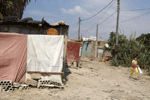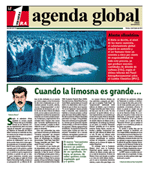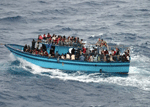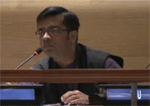Social Watch news
Published on Wed, 2013-10-16 10:01
The decade-long economic expansion in Africa has not translated into improved conditions of living for ordinary Africans. Indeed, many Africans remained trapped in the circle of joblessness, material deprivation, poverty, insecurity, loss of livelihood and mining related environmental disasters. African governments challenged to reinforce ongoing fiscal reforms and mining contract renegotiations with other measures to improve the equity between state and investor in the booming extractive sector and also to finance the AMV in full.
|
Published on Thu, 2013-10-10 14:29

Photo: UNHCR/S. Malkawi
|
One cannot discuss policy priorities and challenges in Lebanon without first addressing the dangerous developments the region is currently experiencing. Oppression, backwardness and the shortcomings of democracy in the region as a whole are serious hindrances that could turn the tide and reverse the more positive trends. Despite the challenges they raise, the current developments clearly demonstrate the potential for change in the region: people are no longer willing to stand idle in the face of tyranny, poverty, unemployment and marginalization.
Lebanon is still facing the systemic challenges of the political confessional system. The state must be an institutional and constitutional expression of democracy and people’s rights. Genuine citizenship cannot be achieved without the rule of law, without a system that gives citizens their rights and duties towards both society and the state, which are also preconditions for an effective civil society. Thus the main obstacle to true citizenship in the country is still the partition of state offices and institutions among the different religious confessions.
|
Published on Wed, 2013-10-09 23:00
While the debate around increasing corporate influence at the United Nations is growing, Secretary-General Ban Ki-moon sticks with his plan to establish a new United Nations Partnership Facility within the UN Secretariat. The new facility is intended to "scale up UN capacity to engage in transformative multi-stakeholder partnerships with the private sector, civil society, philanthropists and academia across a broader range of issue areas". But as financing for the new institution will come from donors rather than from regular UN budget, questions to its accountability and oversight arise. Roberto Bissio, director of the Third World Institute in Montevideo, raises such questions in context of the current discussions of a post-2015 development agenda.
|
Published on Wed, 2013-10-09 16:09
The application of Guiding Principles on Business and Human Rights (GPs) in the financial sector came under focus at hearings held in the United States (Washington DC and New York).
The hearings were part of activities by the Working Group on Business and Human Rights, a United Nations body established in 2011 to promote dissemination and implementation of the Guiding Principles. One of the ways in which the Working Group does this is by carrying out visits to particular countries to look at implementation by companies therein.
|
Published on Mon, 2013-10-07 23:00

Sub-Saharan African
migrant workers
arrives in Lampedusa.
(Photo: Kate Thomas - IRIN)
|
The tragic loss of some 300 refugees off Lampedusa on October 3 gives public focus to the harsh and cruel reality facing thousands fleeing insecurity and oppression in the countries of their birth. A boat which traveled from Libya caught fire in close reach of the Italian coast. There were some 500 Eritreans on board, but only 147 were rescued according to media reports.
The large loss of life taking place in sight of the Italian beaches has shocked Italy, Europe and the world. It emphasizes the failure of Europe and Africa to protect the rights of refugees who embark on their perilous voyages believing that they have little choice. According to the UN, 30,100 migrants reached Italy by sea so far this year and some 7,500 Eritreans have been registered amongst them. October 5 is being observed as a day of mourning and Pope Frances has called for ‘a day of tears’.
|
Published on Mon, 2013-10-07 23:00
The Italian government has published the names of the occupants of the boat that drowned near Lampedusa on October 3. All those on the list appear to be Eritreans. At the weekend hundreds of bodies were recovered, washed ashore on the Italian island of Lampedusa. The European Union is soul-searching and identifying the problems of its increasingly repressive refugee and asylum policy.
A meeting of Ministers of Home Affairs has been called in Luxemburg to consider a package of measures, in a first response to the Lampedusa tragedy. Observers are pointing out that the effect of the European policy to effectively control the ‘safe routes’, forces the most desperate refugees to take ever bigger risks in their attempt to reach safety.
|
Published on Thu, 2013-10-03 18:55
The event "From aspiration to action: A Human Rights Framework for the post-2015 Agenda" took place on September 25, 2013 at the United Nations in New York, with participation from the Tunisian Minister for Social Development, Mr Khalil Zaouia; Ms. Patrizianna Sparacino, French Ambassador for Human Rights; Mr. Ivan Šimonović, Assistant Secretary-General for Human Rights, OHCHR; Ms. Saraswathi Menon, Director of Policy Division, UN Women and Roberto Bissio, from Social Watch.
Social Watch coordinator, Roberto Bissio, "Humans have rights and they are inalienable, corporations have privileges and those are revocable." To see his participation on the debate click here.
|
Published on Thu, 2013-10-03 14:55
Speaking at the UN General Assembly articulating the Indian civil society aspirations on actions to make the new development agenda work in developing nations that are home to 85 percent of the world's poor, Amitabh Behar representing National Social Watch (India) and Wada Na Todo Abhiyan emphasized that, “for the new development agenda to succeed, we need to move away from a poverty lens to a more holistic justice frame.” The new development frame will succeed the current Millennium Development Goals (MDGs) that expire in 2015.
Mr. Amitabh Behar, a representative of a coalition of 4,000 Indian civil society organisations under the umbrella National Social Watch and Wada Na Todo Abhiyan, voiced the civil society concerns related to the new development agenda at the UN Special Event on MDGs at the 68th General Assembly in New York on September 25.
|
Published on Wed, 2013-10-02 18:42

Photo: NGLS.
|
Over 1,000 representatives from civil society, governments and the United Nations gathered on 22 September at UN Headquarters in New York for an open dialogue on critical regional issues and policy recommendations looking forward to the next global development agenda. “Advancing Regional Recommendations on the Post-2015 Development Agenda,” organized by the UN Non-Governmental Liaison Service (UN-NGLS) in partnership with the Post-2015 Development Planning Team of the Executive Office of the Secretary-General (EOSG), launched the report of the UN-NGLS regional civil society consultations carried out from May through August 2013. The event convened the largest single gathering of civil society in the post-2015 process to date.
|
Published on Wed, 2013-10-02 14:34
UN-NGLS launched the publication of its report "Advancing Regional Recommendations for the Post-2015 Development Agenda," the synthesis of a four-month consultation conducted in writing and via teleconferences with 120 regional civil society networks. The report can be downloaded here [pdf].
|
SUSCRIBE TO OUR NEWSLETTER
Submit

|












